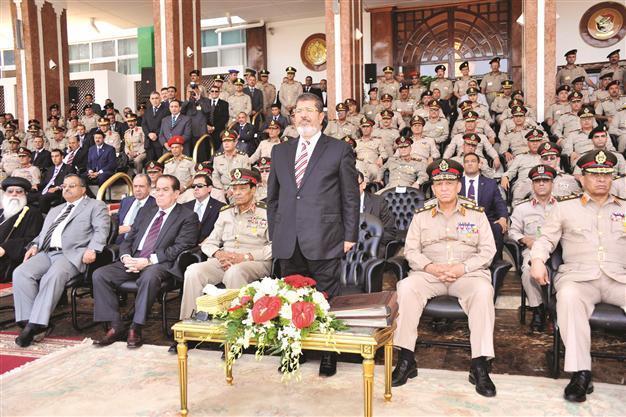Egypt faces political limbo
CAIRO

Egypt’s President Morsi (2nd R) with Field Marshal Mohamed Tantawi (3rd R), head of Egypt’s ruling Supreme Council of the Armed Forces (SCAF), and Egyptian Armed Forces Chief of Staff Sami Anan (R), attend a medal ceremony at a military base in Alexandria. REUTERS photo
Egypt’s Parliament has been hanging in legal limbo after a top court overruled a presidential decree reinstating the dissolved house, stepping up a power struggle between the president and the army.
“The battle for power centers around the judiciary,” read the headline of independent daily Al-Watan. The Supreme Constitutional Court annulled a decree by newly elected President Mohamed
Morsi on July 10 reinstating the lower house of Parliament, after the top court last month ruled it was invalid.
“The court ordered a freeze of the president’s decree,” a judicial source said, adding that it “ordered that its previous ruling be implemented.” Morsi had ordered Parliament back and invited it to convene last weekend. Taking its cue from the president, the People’s Assembly met July 10. The origins of the battle for Parliament lie in a constitutional declaration issued by the Supreme Council of the Armed Forces (SCAF). The declaration, which acts as a temporary constitution until a new charter is drafted, granted the military sweeping powers, including legislative control, rendering the presidential post little more than symbolic.
The SCAF consists of generals appointed by Mubarak, as was the head of the Constitutional Court, which annulled Parliament because it found that certain articles of the law governing its election were invalid. Critics said the decision was politically motivated. “The Constitutional Court, whose judges were appointed by Mubarak, has canceled the president’s decree and restored the field marshal’s decree,” wrote prominent writer and commentator Alaa al-Aswany, referring to SCAF head Hussein Tantawi. “The message is clear: The elected president is not to exercise power without the military,” he said.
Morsi in Saudi Arabia“The best strategy for Morsi now might be to avoid confrontational policies and begin to slowly create a power base for himself in the higher circles of the country’s body politic,” said Azzedine Layachi, a Middle East expert from St. John’s University in New York. Meanwhile, Morsi was scheduled to make his first overseas trip to Saudi Arabia yesterday.
He was expected to meet with King Abdullah as well as visit the holy city of Mecca. The Saudi ambassador said the visit is aimed at enhancing relations between the two countries as well as boosting economic ties.
Egypt-Saudi ties have been restrained since the ouster of former president Hosni Mubarak and were further tested after Ahmed al-Gizawy an Egyptian lawyer and human rights activist, was arrested on charges of drug smuggling in the Saudi kingdom in April.
